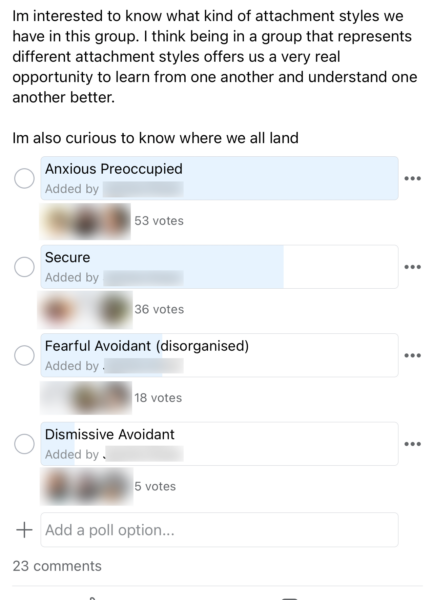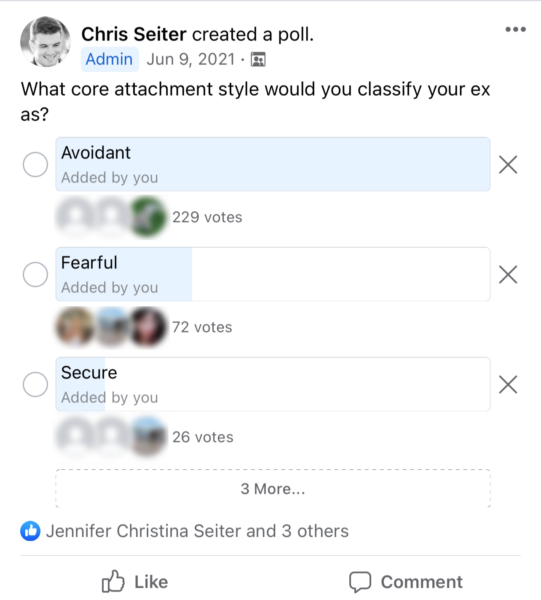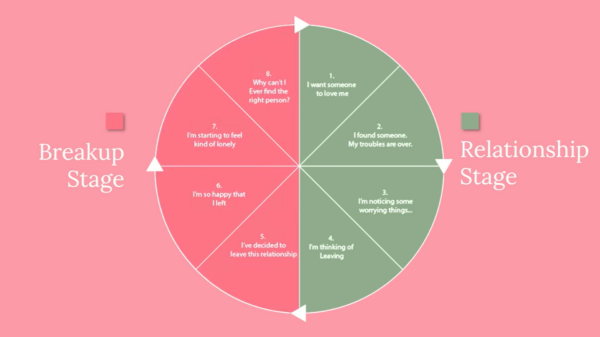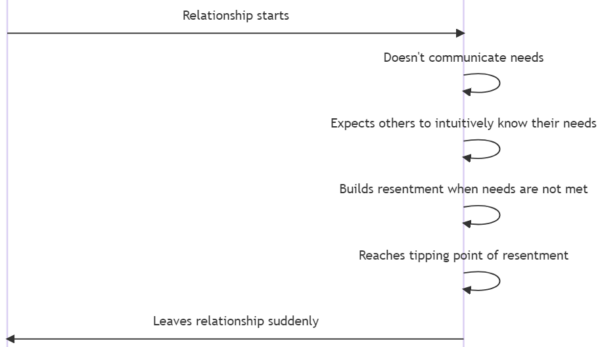This is going to be a fun one. I’m going to explore why avoidants tend to abruptly break up with you.
Ah, but I’m not just going to look at dismissive avoidants, no, I’m going to look at fearful avoidants as well.
And I’m going to start by saying something that might be considered controversial.
Dismissive avoidants aren’t as likely to Abruptly break up with you while fearful avoidants are.
The keyword to pay attention to there is “abruptly.”
So, what I’d like to do in this article is go through a deep dive on pretty much everything relating to these two attachment styles.
- Helping You Understand The Core Wound Of The Dismissive And Avoidant
- Making A Case For Why I Don’t Think Dismissive Avoidants Will Break Up With You Abruptly
- Doing A Deep Dive Into Why Dismissive Avoidants Leave Relationships
- Comparing That To Why Fearful Avoidants Leave Relationships (And Why That Makes Them Perfect Candidates To Leave You Abruptly)
There’s a lot to talk about here today.

What Are Your Chances of Getting Your Ex Boyfriend Back?
Take the quizLet’s Take A Look At The Two Core Wounds
Alright, the first thing we need to do here is lay the groundwork for understanding both of these attachment styles.
I see a lot of people getting confused with the difference between a fearful avoidant attachment style and a dismissive avoidant attachment style.
I think a lot of that confusion stems from the phrasing used.
I myself am guilty of this, where I sometimes say,
“Hey, here’s how to get your avoidant to miss you” or “Hey, here’s how to get your fearful avoidant to miss you.”
One look at my YouTube videos is enough to prove that,
The key difference is that many people perceive “avoidant” as an all-encompassing term, but it’s not.
In reality, there are two distinct types.
- Dismissive
- Fearful
So, let’s break it down.
The easiest way to differentiate between a dismissive avoidant and a fearful avoidant is to look at the core wounds associated with insecure attachments.
I talk about that extensively in this interview,
Oddly enough, while there are four main attachment styles, there are only two types of core wounds:
- The avoidant core wound
- The anxious core wound.
Let’s talk about those for a moment here.

What Are Your Chances of Getting Your Ex Boyfriend Back?
Take the quizAvoidant Core Wound:
The avoidant core wound is triggered by anything that threatens one’s independence. For example, in a relationship, if you’re asking to take the next step and your partner ignores or avoids the topic, it activates their avoidant core wound.
Anxious Core Wound:
On the other hand, the anxious core wound revolves around the fear of abandonment. Anything in a relationship or in your life that makes you feel like you’re going to be abandoned triggers anxiety, potentially leading to controlling behavior or desperation.
Now, let’s apply these core wounds to differentiate between a dismissive avoidant and a fearful avoidant.
- A dismissive avoidant primarily carries the avoidant core wound. They are more inclined to react strongly when their independence is threatened. For a dismissive avoidant, anything that compromises their autonomy triggers them.
- On the other hand, a fearful avoidant experiences both core wounds. They have the avoidant core wound, which makes them crave independence, but they also harbor the anxious core wound, leading to a fear of being left alone.
What makes fearful avoidance particularly challenging is that they can swing from one end of the spectrum to the other.
And to visualize this, I’m going to show you a graphic representing our core wound spectrum.
This spectrum will help you understand the extremes associated with these attachment styles.
Specifically, the fearful avoidant individual can be highly triggered by their avoidant core wound at one moment, and then equally triggered by the anxious core wound in the next moment.
Why I Believe Dismissive Avoidants WON’T Break Up With You Abruptly
A couple of days ago, I wrote an article on this website exploring codependence and the frequency of returns from codependent exes.
In that article, I examined different pairings of attachment styles.
Now, my argument against the likelihood of a dismissive-avoidant abruptly ending a relationship with you is rooted in two factors.
- The internal polls and experience I have
- The research I did for that codependence article
Let’s talk about the polls for a minute (because I attach them to almost every article I do now.)
So yes, I conducted polls within our community and discovered that most of our clients tend to have anxious attachment styles,
While their exes tend to have avoidant attachment styles,
And in my research on that codependent article I found that this pairing happens to be one of the most common amongst attachment styles.
Let’s consider a scenario where someone with an anxious attachment style enters a relationship with someone who has an avoidant attachment style.
The assumption is that they are incompatible, like oil and water.
However, this assumption is somewhat incorrect. Our findings indicate that this pairing is one of the longest-lasting attachment styles, and there’s a reason for it.

What Are Your Chances of Getting Your Ex Boyfriend Back?
Take the quizOne might assume that there is an inherent clash between the partners: one undervalues emotional closeness, while the other overvalues it. This often leads to a stressful, filled, and anxious codependent experience for both parties. The dismissive partner finds satisfaction in reaffirming their perception of their partner as overly clingy and enjoys controlling the relationship by providing just enough attention to keep the anxious partner invested. However, the relationship never progresses beyond that point. Despite being dissatisfied with their current circumstances, the anxious individual remains in the relationship due to their fear of loneliness.
And it makes total sense, their core wound is the fear of abandonment, which prevents them from leaving and venturing out on their own, as they are afraid of losing what they have.
This particular pairing, apart from a secure attachment with secure attachment, lasts the longest compared to other attachment style pairings.
Understanding The Reasons For Why Dismissive’ s Break Up
Dismissive avoidants often end up leaving relationships due to a sense of helplessness or past experiences that have influenced their perception of events.
During the honeymoon phase of a relationship, dismissive avoidants feel comfortable. There’s less need for commitment, no expectation of pressure or vulnerability. However, as the relationship progresses beyond the honeymoon phase, their fears start to emerge.
From my observations, dismissive avoidants do end up breaking up with their partners, but it takes longer and is usually not abrupt.
(Just continuing to hammer this point home.)
This is why my concept of the avoidant death wheel has gained popularity.
If you examine the stages of the avoidant death wheel, you’ll see that it’s not typically an abrupt process.
It often involves one person neglecting to recognize the red flags (which is a common thing for an anxious attachment style to do.)
There are eight stages in total.
- The avoidant starts by wanting someone to love them
- They then believe their troubles are over when they find you.
- Then they begin to notice worrying things, which are usually related to your anxious side if you have an anxious attachment style.
- However, they don’t immediately break up with you. Instead, they start contemplating the idea of breaking up. Based on their previous relationship experiences, they know what to do but delay taking action.
- This leads to stage five, where they decide they want to leave the relationship.
- After leaving, they go through a euphoric period where they feel happy about their decision.
- However, they eventually start to feel lonely being on their own because, deep down, they don’t truly want to be alone.
- Self-pity sets in, questioning why they can’t find the right person, and this ultimately leads them back to the beginning, searching for either a phantom ex or a new relationship to relive the honeymoon period.
So ya, Dismissive avoidants are not the ones who abruptly break up with their partners, as the avoidant death wheel illustrates.
There are usually signs along the way that indicate their intentions.
And an abrupt breakup will feel like it came out of nowhere.
Which leads us to the fearful avoidant.
Studying Fearful Avoidants And Why I Believe They Are Better Candidates To Break Up With You Abruptly
Fearful avoidance, on the other hand, is different.
Fearful avoidants are the ones who abruptly break up with you, partly due to their volatile nature.
As I mentioned before, if you look at the spectrum graphic I created, you’ll see that they possess both of these core wounds.
Like a pendulum, they can swing from one end of the spectrum to the other.
However, the most significant misunderstanding people have about fearful avoidance is their tendency to not communicate their needs in a relationship.

What Are Your Chances of Getting Your Ex Boyfriend Back?
Take the quizIn fact, they can be quite challenging to deal with because they expect their partners to intuitively understand their relationship requirements. This behavior stems from their hypersensitivity and ability to read micro expressions and body language, which they have developed as an adaptive mechanism in response to trauma. When their partners fail to meet these unexpressed needs, they interpret it as a lack of care and unworthiness. Their anxious side gets triggered, leading to resentment and eventual withdrawal from the relationship.
Essentially, this creates a six-step stage.
- The relationship with the fearful avoidant starts off well, much like the honeymoon period.
- However, throughout the relationship, the fearful avoidant fails to communicate their needs
- Expecting their partner to know them.
- When their needs remain unmet
- Resentment builds up within them until it reaches a tipping point
- Which causes them to abruptly leave the relationship.
The craziest part is that they do not communicate with you, which contributes to the sense of abruptness.
From the perspective of a fearful avoidant, it isn’t abrupt for them; they are working through the cause and effect process pictured above.
However, from your standpoint, it feels sudden because they haven’t talked to you or expressed their needs.
Dealing with this can be incredibly difficult.
Therefore, my argument is a simple one: fearful avoidants are the ones who abruptly break up with you because they fail to communicate, expecting you to understand their needs.
When you don’t, they move on to the next person, driven by the volatile nature of their shifting from one end of the attachment theory spectrum to the other, always searching for their next fix, whether it’s with you or someone else.






Mark
December 9, 2024 at 12:39 am
Chris as a Fearful avoidant, I don’t feel this acuratetely represents me at all and not really compared to the FA groups that I am in as well. Trust and congruency is everything and we really do communicate our needs, but when you dont hear us or if your actions don’t match what you say, we really feel that x10. Also with FA’s, we exist across a spectrum either leaning Anxious or towards Avoidant – I lean anxious. As such I give warnings if I am unsure and chance to adjust, but this rings hollow with a DA as they just double down or get confused by us. We just need trust to be reciprocated and a chance to let our guard down, but sometimes that gaurd is a bit unrealist and unfortunately for those who aren’t self aware, onesided. The trust/ fear anxiety is louder than reality and that is something we have to ease up on, especially when someone is trying as their needs matter too.
I will note, that the more I spend with people I hear say that they are anxious, I am seeing Fearful Avoidant tendenacies, especially with people like to just cut people off if they “cross them”, classic self protection of an FA.
Andrew
June 18, 2024 at 4:39 pm
I’d never heard of the terms dismissive/fearful avoidant, anxious and secure before….I just thought you got on,coz you got on!
I was with my girl for only 3 months, but we both said it’s like we’ve known each other for 10 years. We got on SO well, with laughter all the way. We shared a bed a couple of times, but it was just kissing and cuddling as it was early days for her…I respected that….and we were very happy. Sex ain’t everything!
But we talked about the future. About going away together and looking forward to the rest of our lives together. Our last date in January was THE BEST DAY EVER! I felt so lucky to have found her and she told me the same. We felt so comfortable with each other.
Then!…..The week after that, one of her oldest,closest friends sadly passed away. I wanted to be there for her, as any decent partner would. But she needed space, which I respected. She was understandably very upset.
When she text me a few days later, she suggested getting gig tickets and a hotel. So I bought the tickets and we were really looking forward to spending more time together.
A few days after…..It all came crashing down as she text me that her romantic feelings for me had gone. I was distraught, as I thought we’d BOTH found our other half. However, I put this down to her grieving and text her back. Asking what’s happened, but keeping in mind ther loss of her friend. She told me to leave her be. Natural instinct is to chase for what you want…I didn’t go in feet first,but I’d ask how she was. Then I got ignored and then a month later,.universally blocked. I sent her a card 2 months after just to say,.Hi…How are you….Nothing!
I want her back, as we had such a laugh together..Even if she’s dating someone else, I’d rather have her as a friend than nothing at all….and if she wants another relationship with me, I’d take it ultra slow…give her space….and even suggest we both need to go to a Councillor..
I should say, she had a rough childhood and a tough life in general.
Could the death of her friend have triggered her?
Jane
June 14, 2024 at 10:20 am
I think I just met the fearful avoidant, for the first time in a longtime, thought I’d met a gentleman. We had quite a lot in common, we love the same music, our travel bucket lists are identical, quite similar personalities and we bonded about how much other people annoy us and we could be hermits together. On our dates we laughed and never ran out of conversation. We agreed to get to know each other slowly and not put any past heavy issues onto each other at the early stages. As the dates progressed for me, the attraction grew, because I felt a connection, we didn’t kiss properly until the third date and the last date lasted 8 hours and just involved walking around the city and hand holding, stopping in the middle of the street for embraces and hugging and kissing, he invited me to an even he had coming up in a months time. We talked about me staying over soon and what we would watch and what he would cook, but didn’t set that date yet. The next scheduled date we had, I cancelled due to getting the flu, when I felt better we rescheduled and he told me how much he couldn’t wait to see me and embrace me again. He said this for 2 days and the following morning I woke up to the most confused cold message I’ve ever received. Stating he’s been incredibly attracted to me, but not sure how compatible we are and what do I think, but then halfway through the message says we don’t have anything to talk about and are completely incompatible and as much as he’s been infatuated with me, it’s best he says this now, goodbye. I was completely shocked, all of our dates had been very long and we talked endlessly on them and all he’d talked about was how much he liked me and how much he enjoyed them and couldn’t wait to see me. I replied telling him how shocked I was by this and how he’s been telling me the complete opposite, his response was even colder than the first message. So I told him he’s led me on and it’s not ok to treat people like that, communicating one thing and thinking something completely different and not actually picking up the phone to talk. He blocked me straight afterwards. I’ve been feeling so hurt and confused.
Cheryl
February 17, 2024 at 4:41 pm
This article is AMAZING!!! I had never heard of attachment styles until my recent ex. Then I dove in, learning everything I could. He is definitely a Dismissive Avoidant. I am normally a Secure Attachment style but I ventured over to Anxious Attachment with him (for obvious reasons). I was very patient and understanding. I knew better than to stick around but I felt we had a great connection. He said he thought we did too. He was lying. He liked the affection and the attention. But, as soon as things started getting serious, his commitment phobia kicked in. I’ve encouraged him to educate himself on Avoidant Attachment style. My guess is he won’t but the first thing he said when we broke up is he felt he needed therapy. That was either another lie or he maybe, at 47, he’s starting to realize he needs help. He had a GREAT girlfriend in me. Affectionate, loving, funny/witty, smart, and a hottie, if I say so myself!! When we were together, we felt like the perfect couple. It was the time apart that was brutal. Now, I just keep praying that someone who values me will enter my life.